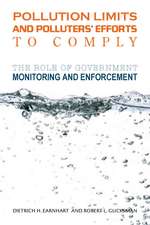From Heresy to Dogma: An Institutional History of Corporate Environmentalism. Expanded Edition
Autor Andrew Hoffmanen Limba Engleză Paperback – 30 sep 2002
This is a pathbreaking account of how the environmental movement has led to profound changes in the perceptions and practices of large-scale corporations, as shown here in the chemical and petroleum industries. The book traces how market, social, and political pressures drive corporations to respond to environmental issues, analyzes the cultural frames that organizations use to come to terms with these external influences, and describes the resulting changes in organizational culture and structure. For this expanded edition, the author has written a new chapter that brings his original assessment up to date, expands and modifies the model and data used in the original edition, and offers a broad picture of the current state of corporate environmentalism and where it is going.
Preț: 303.33 lei
Nou
Puncte Express: 455
Preț estimativ în valută:
58.05€ • 60.26$ • 48.40£
58.05€ • 60.26$ • 48.40£
Carte tipărită la comandă
Livrare economică 22 martie-05 aprilie
Preluare comenzi: 021 569.72.76
Specificații
ISBN-13: 9780804745031
ISBN-10: 080474503X
Pagini: 320
Dimensiuni: 152 x 229 x 18 mm
Greutate: 0.42 kg
Ediția:1
Editura: Stanford University Press
Colecția Stanford Business Books
ISBN-10: 080474503X
Pagini: 320
Dimensiuni: 152 x 229 x 18 mm
Greutate: 0.42 kg
Ediția:1
Editura: Stanford University Press
Colecția Stanford Business Books
Recenzii
"A timely review of the sea change that has taken place in American corporations in the past thirty-five years. Hoffman's history offers an intriquing perspective of the external drivers and the internal workings of a firm as it wrestles with ever-increasing demands for environmental protection. It gives the reader a rich history, engaging analyses, and provocative conclusions."—William D. Ruckelshaus, former administrator, U.S. Environmental Protection Agency
"You've got a winner here, one that will be of broad appeal to multiple audiences. . . . Hoffman's book fills a huge void in the literature of environmentalism."—Thomas N. Gladwin, professor and director, Global Environmental Program, Leonard N. Stern School of Business, New York University
"In this readable volume, Hoffman accomplishes his objectives of reaching out to practitioners and social science scholars and environmentalists. . . . Recommended for general readers and academic audiences, lower-division undergraduate through professional."—Choice
Notă biografică
Andrew J. Hoffman is Assistant Professor of Organizational Behavior at the Boston University School of Management. He is the author of Competitive Environmental Strategy: A Guide to the Changing Business Landscape, the editor of Global Climate Change: A Senior Level Dialogue, and co-editor of Organizations, Policy, and the Natural Environment: Institutional and Strategic Perspectives (Stanford, 2002).
Textul de pe ultima copertă
“A timely review of the sea change that has taken place in American corporations in the past thirty-five years. Hoffman’s history offers an intriquing perspective of the external drivers and the internal workings of a firm as it wrestles with ever-increasing demands for environmental protection. It gives the reader a rich history, engaging analyses, and provocative conclusions.”—William D. Ruckelshaus, former administrator, U.S. Environmental Protection Agency
“You’ve got a winner here, one that will be of broad appeal to multiple audiences. . . . Hoffman’s book fills a huge void in the literature of environmentalism.”—Thomas N. Gladwin, professor and director, Global Environmental Program, Leonard N. Stern School of Business, New York University
“You’ve got a winner here, one that will be of broad appeal to multiple audiences. . . . Hoffman’s book fills a huge void in the literature of environmentalism.”—Thomas N. Gladwin, professor and director, Global Environmental Program, Leonard N. Stern School of Business, New York University
Descriere
This is a pathbreaking account of how the environmental movement has led to profound changes in the perceptions and practices of large-scale corporations, as shown here in the chemical and petroleum industries.


















